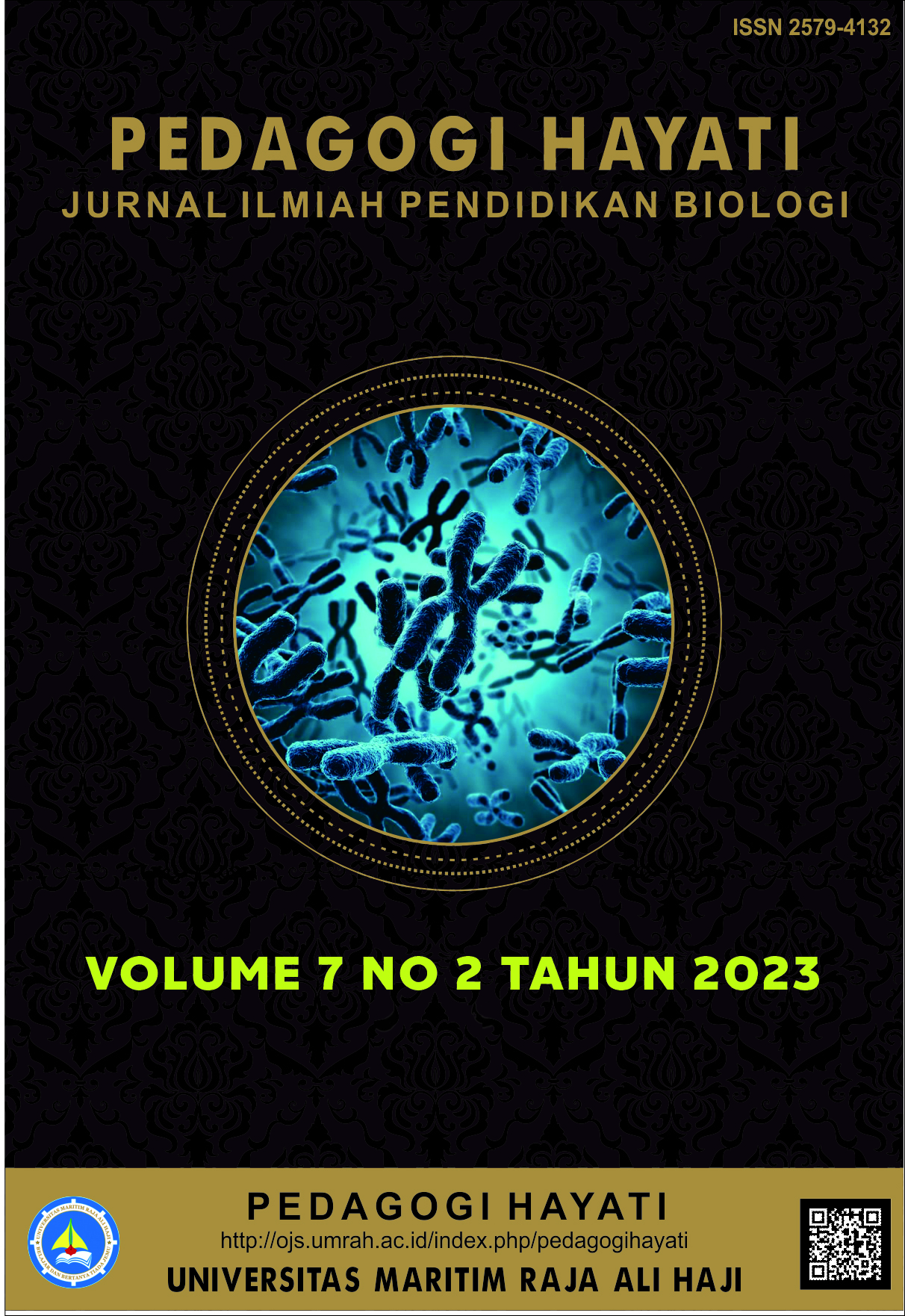Emotion Detection with AI: Development of Learning Media for Evaluation of Cognitive Load of Prospective Teacher in Genetics Lectures
DOI:
https://doi.org/10.31629/ph.v7i2.7664Keywords:
artificial intelligence, cognitive load, emotion, geneticsAbstract
Cognitive load can be measured, one of which is by emotions through facial expressions during learning. This research aims to develop learning media by integrating artificial intelligence (AI) that is able to detect the emotions of prospective teachers during genetics lectures. Using AI technology, the system can evaluate students' cognitive load in real-time through facial expression analysis. This learning media is equipped with emotion detection features, interactive learning materials, and an informative dashboard to monitor student learning progress. This research is a development research that refers to the Borg & Gall model. The data collection technique is in the form of questionnaires and questions integrated into AI media that detects student emotions, which are then analyzed using machine learning algorithms to identify the level of cognitive load during the lecture session. The results of the study showed that this learning medium was able to identify the emotional expression of each student in the genetics of mendelism with a percentage of 61.64% (surprised-happy) describing a moderately low-very low cognitive load, and 38.42% (sad-angry) describing a high cognitive load. So that with the acquisition of this data, it is known that more than 50% of students' emotional recordings (low cognitive load) can follow and understand the information obtained in the Mendelism genetics lecture. The application of this technology is expected to improve the quality of learning and help students achieve a better understanding of genetics courses.
References
Afidah, V. N. (2020). PRINSIP- PRINSIP TEORI BEBAN KOGNITIF DALAM MERANCANG MEDIA PEMBELAJARAN MATEMATIKA. JP2M (Jurnal Pendidikan Dan Pembelajaran Matematika), 1(2). https://doi.org/10.29100/jp2m.v1i2.195
Aries Tejamukti. (2017). Analisis Beban Kognitif Dalam Pemecahan Masalah Matematika. STKIP PGRI Tulungagung, (ISBN:978-602-50110-3-0).
Azwal, R. A., & Sari, M. (2019). Pengembangan Media Pembelajaran pada Website Tanpa Jaringan untuk Kemandirian belajar Peserta Didik. Natural Science: Jurnal Penelitian Bidang IPA Dan Pendidikan IPA, 5.
Daffa Ulhaq, M. R., Zaidan, M. A., & Firdaus, D. (2023). Pengenalan Ekspresi Wajah Secara Real-Time Menggunakan Metode SSD Mobilenet Berbasis Android. Journal of Technology and Informatics (JoTI), 5(1). https://doi.org/10.37802/joti.v5i1.387
Hastuti, I. D., & Ghoni, A. (2022). PENGEMBANGAN MEDIA PEMBELAJARAN BERBASIS WEBSITE PADA MATERI TATA SURYA. Primary: Jurnal Pendidikan Guru Sekolah Dasar, 11(1). https://doi.org/10.33578/jpfkip.v11i1.8640
Juanengsih, N., Rahmat, A., Wulan, A. R., & Rahman, T. (2018). Pengukuran Beban Kognitif dalam Perkuliahan Biologi Sel. Edusains, 10(1).
Limanjaya, L. C., Khoswanto, H., & Sugiarto, I. (2023). Sistem Untuk Mengklasifikasikan Emosi Dan Mendeteksi Wajah Pada Pembelajaran Daring. Jurnal Teknik Elektro, 15(2). https://doi.org/10.9744/jte.15.2.41-47
Mardin, H., Handani Uno, A., Despianti, S. R., & Lakutu, D. N. (2022). PENGEMBANGAN MEDIA PEMBELAJARAN BERBASIS WEBSITE BAGI GURU SD IT QURRATU ‘AYUN KOTA GORONTALO. Jurnal Pendidikan Dan Pengabdian Masyarakat, 5(3). https://doi.org/10.29303/jppm.v5i3.3760
Nursit, I. (2015). PEMBELAJARAN MATEMATIKA MENGGUNAKAN METODE DISCOVERY BERDASARKAN TEORI BEBAN KOGNITIF. JPM : Jurnal Pendidikan Matematika, 1(1). https://doi.org/10.33474/jpm.v1i1.403
Ouwehand, K., Kroef, A., Wong, J., & Paas, F. (2021). Measuring cognitive load: Are there more valid alternatives to Likert rating scales? Frontiers in Education. frontiersin.org. https://doi.org/10.3389/feduc.2021.702616
Pan, Y., Froese, F., Liu, N., Hu, Y., & Ye, M. (2022). The adoption of artificial intelligence in employee recruitment: The influence of contextual factors. The International Journal of …. https://doi.org/10.1080/09585192.2021.1879206
Putri, I. I., & Rahmat, A. (2024). Assessing Genetics Learning Media Effectiveness : Students Perspectives. Atlantis Press SARL. https://doi.org/10.2991/978-2-38476-216-3
Rahmat, A., Nuraeni, E., Soesilawaty, S. A., Alawiyah, D., & Garnasih, T. (2015). Beban kognitif dan kemampuan penalaran siswa SMA, MA, dan SMA berbasis pesantren pada pembelajaran Biologi. Prosiding Semnas Sains & Entrepreneurship Ii, (1994).
Rahmat, A., Soesilawaty, S. A., Fachrunnisa, R., Wulandari, S., Suryati, Y., & Rohaeni, H. (2014). Beban Kognitif Siwa SMA pada Pembelajaran Biologi Interdisiplin Berbasis Dimensi Belajar. Prosiding Mathematics and Science Forum 2014.
Rahmawati, R., Achdiani, Y., & Handayani, M. N. (2021). PENGEMBANGAN MEDIA PEMBELAJARAN BERBASIS WEBSITE WIX PADA MATA PELAJARAN PRODUKSI PENGOLAHAN HASIL NABATI DI SMKN 2 CILAKU CIANJUR. EDUFORTECH, 6(2). https://doi.org/10.17509/edufortech.v6i2.39293
Royani, E., Haris, M., & Hadisaputra, S. (2021). Pengembangan Media Pembelajaran Kimia Berbasis Website 2 Apk Builder pada Materi Larutan Asam Basa. Chemistry Education Practice, 4(2). https://doi.org/10.29303/cep.v4i2.2670
Suwarno, M. (2020). Teori Beban Kognitif dalam Pengembangan Multimedia Pembelajaran Matematika. Alauddin Journal of Mathematics Education, 2(2). https://doi.org/10.24252/ajme.v2i2.16924
Wei, P. C., He, F., & Huang, S. (2018). Effects of instructional multimedia integrated situational approach on students’ learning achievement. Eurasia Journal of Mathematics, Science and Technology Education, 14(7), 3321–3327. https://doi.org/10.29333/ejmste/91244
Yao, W., Khan, F., Jan, M. A., Shah, N., ur Rahman, I., Yahya, A., & ur Rehman, A. (2020). Artificial intelligence-based load optimization in cognitive Internet of Things. Neural Computing and Applications, 32(20). https://doi.org/10.1007/s00521-020-04814-w
Yohanes, B., & Yusuf, F. I. (2021). TEORI BEBAN KOGNITIF: PETA KOGNITIF DALAM PEMECAHAN MASALAH PADA MATEMATIKA SEKOLAH. AKSIOMA: Jurnal Program Studi Pendidikan Matematika, 10(4). https://doi.org/10.24127/ajpm.v10i4.4033
Zawacki-richter, O., Marín, V. I., & Bond, M. (2019). Systematic review of research on artificial intelligence applications in higher education – where are the educators ?











